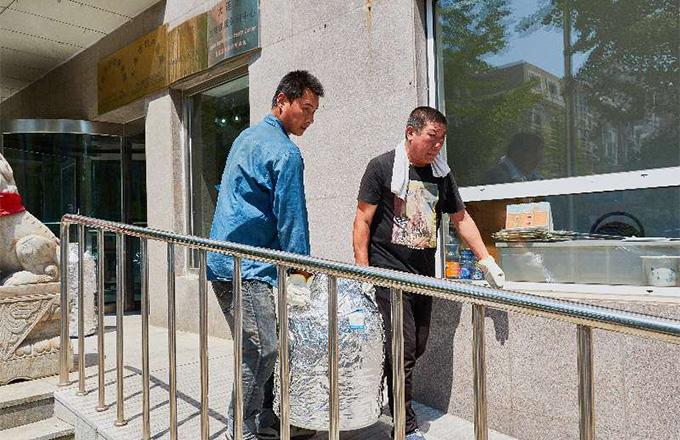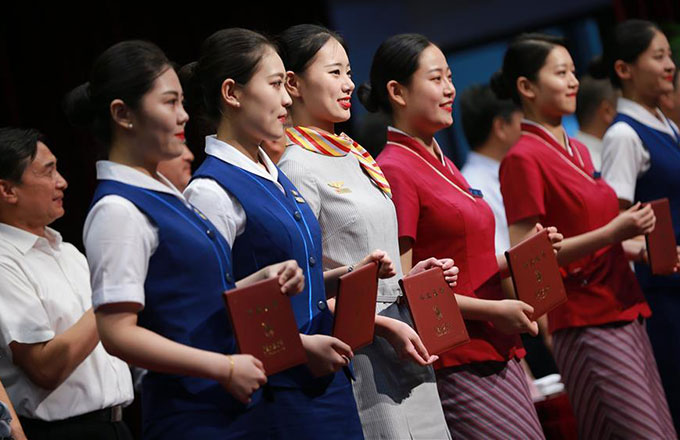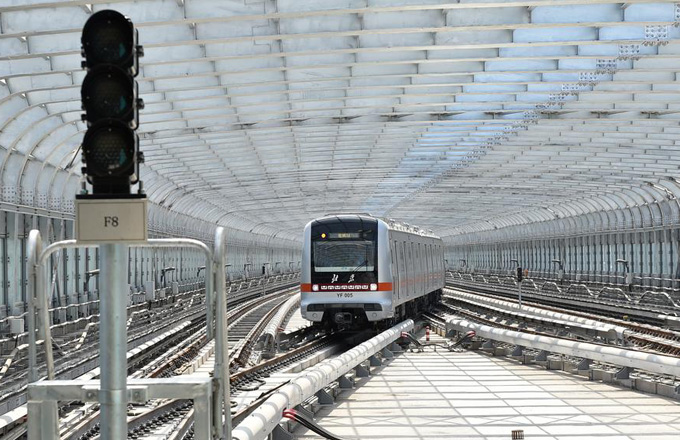20 years prove success of 'one country, two systems': official
HONG KONG - Twenty years is enough to provide compelling evidence for the success of the "one country, two systems" principle in the Hong Kong Special Administrative Region (HKSAR), a central government official based in Hong Kong told Xinhua in an interview.
In April, President Xi Jinping described the "one country, two systems" principle in the HKSAR as a "great success." Zhang Xiaoming, director of the Liaison Office of the Central People's Government in the HKSAR, said, "Anyone who respects the facts and who is without prejudice would endorse the evaluation."
July 1 marks the 20th anniversary of Hong Kong's return from British rule and the establishment of the HKSAR. Enacted in accordance with China's Constitution, the Basic Law of the HKSAR specifies the guidelines of "one country, two systems" and "Hong Kong people administering Hong Kong" with a high degree of autonomy.
According to Zhang, since 1997, the HKSAR has been successfully incorporated into the country's governing system.
"The central government's governance of the HKSAR is running smoothly. Sovereign rights have been manifested, and national security has been safeguarded," he said.
Over the past 20 years, Hong Kong has remained a center of international finance, shipping and trade, and has been recognized by many international agencies as the world's freest economy and most competitive region, Zhang said.
"If you see the accomplishments against a background of the Asian and global financial crises and the SARS outbreak, and in comparison with other developed economies, you will know the achievements have not been easy," said Zhang, who has worked in Hong Kong affairs in the central government since the mid-1980s.
Furthermore, the people of Hong Kong have maintained a high level of autonomy, with the SAR government building up experience and ability in handling affairs within the realm of self-governance and the Hong Kong people enjoying unprecedented democratic rights, according to Zhang.
He pointed out that the core values cherished by Hong Kong society, such as the rule of law, freedom, human rights, justice and integrity, have continued to be respected, and freedom of speech, media and assembly have only increased.
The past 20 years also witnessed closer contact between Hong Kong and the mainland and a clear trend of win-win cooperation, Zhang noted, adding that Hong Kong has been more active in external exchanges as well.
Zhang admitted that during the process of putting the "one country, two systems" principle into practice, encountering new situations, problems and challenges, and even some conflicts is inevitable.p "The issues and problems didn't come from nowhere. The fact that they were solved in accordance with the law proves that the 'one country, two systems' policy is vigorous, resilient and unshakable," Zhang said.
In the face of new situations in Hong Kong, the Central Committee of the Communist Party of China, with Comrade Xi Jinping as the core, has guided the practice of "one country, two systems" from a strategic and overall perspective and attained new breakthroughs, new progress and new achievements in handling Hong Kong affairs, he said.
Important expositions made by Xi and other senior leaders on Hong Kong affairs have enriched the theoretical meaning of the "one country, two systems" principle and will be important for carrying out the principle in the future, he said.
Looking ahead, Zhang believes Hong Kong will benefit greatly from the country's three major development initiatives: the Belt and Road Initiative, the internationalization of the renminbi, and the building of the Guangdong-Hong Kong-Macao Greater Bay Area city cluster.
"On the express train of China's robust economic growth, the country has reserved a seat for Hong Kong," Zhang said, stressing that Hong Kong should dovetail its strengths with the country's needs to achieve greater development.
In April, President Xi Jinping described the "one country, two systems" principle in the HKSAR as a "great success." Zhang Xiaoming, director of the Liaison Office of the Central People's Government in the HKSAR, said, "Anyone who respects the facts and who is without prejudice would endorse the evaluation."
July 1 marks the 20th anniversary of Hong Kong's return from British rule and the establishment of the HKSAR. Enacted in accordance with China's Constitution, the Basic Law of the HKSAR specifies the guidelines of "one country, two systems" and "Hong Kong people administering Hong Kong" with a high degree of autonomy.
According to Zhang, since 1997, the HKSAR has been successfully incorporated into the country's governing system.
"The central government's governance of the HKSAR is running smoothly. Sovereign rights have been manifested, and national security has been safeguarded," he said.
Over the past 20 years, Hong Kong has remained a center of international finance, shipping and trade, and has been recognized by many international agencies as the world's freest economy and most competitive region, Zhang said.
"If you see the accomplishments against a background of the Asian and global financial crises and the SARS outbreak, and in comparison with other developed economies, you will know the achievements have not been easy," said Zhang, who has worked in Hong Kong affairs in the central government since the mid-1980s.
Furthermore, the people of Hong Kong have maintained a high level of autonomy, with the SAR government building up experience and ability in handling affairs within the realm of self-governance and the Hong Kong people enjoying unprecedented democratic rights, according to Zhang.
He pointed out that the core values cherished by Hong Kong society, such as the rule of law, freedom, human rights, justice and integrity, have continued to be respected, and freedom of speech, media and assembly have only increased.
The past 20 years also witnessed closer contact between Hong Kong and the mainland and a clear trend of win-win cooperation, Zhang noted, adding that Hong Kong has been more active in external exchanges as well.
Zhang admitted that during the process of putting the "one country, two systems" principle into practice, encountering new situations, problems and challenges, and even some conflicts is inevitable.p "The issues and problems didn't come from nowhere. The fact that they were solved in accordance with the law proves that the 'one country, two systems' policy is vigorous, resilient and unshakable," Zhang said.
In the face of new situations in Hong Kong, the Central Committee of the Communist Party of China, with Comrade Xi Jinping as the core, has guided the practice of "one country, two systems" from a strategic and overall perspective and attained new breakthroughs, new progress and new achievements in handling Hong Kong affairs, he said.
Important expositions made by Xi and other senior leaders on Hong Kong affairs have enriched the theoretical meaning of the "one country, two systems" principle and will be important for carrying out the principle in the future, he said.
Looking ahead, Zhang believes Hong Kong will benefit greatly from the country's three major development initiatives: the Belt and Road Initiative, the internationalization of the renminbi, and the building of the Guangdong-Hong Kong-Macao Greater Bay Area city cluster.
"On the express train of China's robust economic growth, the country has reserved a seat for Hong Kong," Zhang said, stressing that Hong Kong should dovetail its strengths with the country's needs to achieve greater development.



















